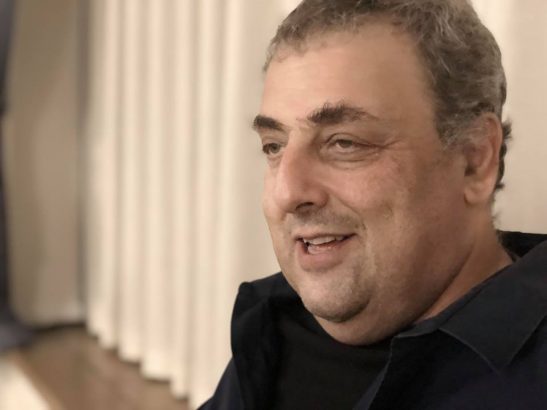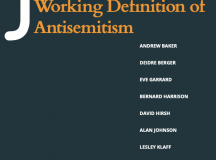A debate is raging at Goldsmiths, University of London after the President of the Student Union tweeted that David Hirsh – a senior lecturer in Sociology at Goldsmiths, a Jew, a lifelong anti-racist, an expert on antisemitism, author of Contemporary Left Antisemitism, and an advisory editor of this journal – is a ‘far right white supremacist’. The local branch of the lecturers trade union, the UCU, expressed its ‘full solidarity’ with the SU President, declaring ‘we are 100% behind you’. The University has now announced an independent review into antisemitism at the college. This is David Hirsh’s response of 26 June to that announcement.
Goldsmiths, University of London has announced an independent review into antisemitism at the College in response to ‘reports of such behaviour’. This is the first time that it has ever recognised that it might have a problem of antisemitism.
Goldsmiths has put out a statement: https://www.gold.ac.uk/news/new-definitions-adopted/.
The latest and perhaps the most explicit manifestation of the antisemitic culture at Goldsmiths concerns tweets that brand me, one of the leading scholars of contemporary antisemitism, as somebody whose intellectual values are profoundly incompatible with the community of scholarship that is the university. After months of thought and argument, the unions at Goldsmiths that hold formal mandates to speak for students and staff have stood by these claims about me.
On 26 March, the President of Goldsmiths Students’ Union tweeted that I am a ‘far right white supremacist’ after I expressed concern about official campaigns to ‘decolonise the curriculum’. She also claimed that my teaching and my writing is racist.
On 11 May, the SU President tweeted that she was being investigated for her response to a ‘Zionist Goldsmiths academic’s explicit racist history’. The twitter account of Goldsmiths UCU, my own union branch, re-tweeted the SU President’s accusations against me, saying that it stood in ‘full solidarity’ with her and that it is ‘100% behind her’.
The tweets are antisemitic because they impose upon me the identity ‘Zionist’, a word that means, in this context, ‘racist’. This understanding constructs the overwhelming majority of ordinary Jews and Jewish institutions as evil.
The tweets are antisemitic further, because ‘far right white supremacist’ means ‘Nazi’. Denouncing Jews as Nazis is antisemitic.
Some colleagues who are, as I am, UCU members, tried to persuade the branch to delete the tweet and to apologise. Excruciatingly, an argument is raging in my university about whether it is fair comment to say I am a Nazi.
On 23 June, the UCU branch re-stated its support for the antisemitic tweets.
It said that any action taken against those responsible for the tweets should be understood to be part of the ‘targeting of activists in Higher Education’ by the Government and by Goldsmiths. It says that in this context, since one of the people involved in the antisemitic abuse is a ‘black Muslim woman student activist’, then it is doubtful that any investigation could be objective.
The Goldsmiths UCU statement refers to the act of denouncing me as a far-right white supremacist as ‘standing in solidarity with a people living under a system of apartheid’.
Frances Corner, the Warden of Goldsmiths, said: ‘We are supporting Dr Hirsh after unwarranted messages about him were posted on social media which I believe are utterly without foundation. These kinds of behaviours are completely unacceptable and will always be challenged.’
‘As Warden I want to make it clear that this kind of conduct is not in line with the College’s values and that it brings harm to individuals as well as our good reputation as a place of learning.’
For two decades, I have done my academic research, and my teaching, in an environment where it is commonplace to regard me as a supporter of apartheid and Nazism, and as an apologist for colonialism and imperialism. In a stereotypically English way, the hostile environment has rarely been articulated. It has generally manifested itself as a freezing out. I have felt as though my work has not been valued by my colleagues, including those who are also my bosses, and including the institution itself. I have had to find my own communities of scholarship.
The hostile environment is not confined to Goldsmiths. It is present in my discipline of sociology and in adjacent disciplines that similarly think of themselves as anti-hegemonic. It makes ‘peer review’, which is the gatekeeper to publication (in the right journals), to research funding, to promotion, to employment, and to Research Excellence Framework recognition, feel like an impossible hurdle. Peer review is anonymous, it can be profoundly conservative and it can be easily manipulated. It can protect and reproduce a rotten culture.
Antisemitic ways of thinking are common in many disciplines and in many institutions. They tend to be tolerated and protected, in a misguided implementation of the democratic values of diversity and academic freedom, by those who have power in academia.
We have seen recently in Britain that antisemitic ways of thinking can be tolerated and indulged among quite broad layers of society. And that tolerance is but a subset of a widening tolerance for anti-democratic thinking and politics of other kinds. Jews are not the only ‘enemy of the people’ being singled out for scorn.
This week is the first time that anybody in authority at Goldsmiths, who speaks for the university, has ever publicly supported me against those who exclude me from the community of scholarship. It is the first time that the institution itself has affirmed that the claim that my work is racist is false.
This is great. I sigh in relief. Things are turning around. There is going to be an inquiry. Finally! And then I remember that affirming that I’m not a Nazi is quite a low bar. The authorities feeling the need to put out a public statement that I’m not a Nazi is pretty humiliating in itself, really.
So I look again at the statement of support, to reassure myself that all this is really happening; and I am reminded that the statement of support is buried at the bottom of an announcement that the College has adopted the IHRA definition of antisemitism; but, it says, ‘without the case studies’.
The International Holocaust Remembrance Alliance (IHRA) definition of antisemitism is a rather mild affirmation that the kind of antisemitism that appears in the language of hostility to Israel exists, and is significant. But without the examples it does not do that. The IHRA definition without the examples is not the IHRA definition and it says nothing of any significance.
Then the Goldsmiths announcement says that the ‘Jerusalem definition’ has also been adopted. It means the ‘Jerusalem Declaration on Antisemitism’, which was written to discredit the straightforward affirmation made by IHRA, that antizionist antisemitism exists, and is significant. The ‘Jerusalem Declaration’ legitimates boycotts, divestment and sanctions against Israel; it legitimates unreasonable, disproportionate and intemperate speech about Israel and about people who are designated as supporters of Israel; it legitimates the singling out of Israel as Nazi, colonial or apartheid; and it legitimates the singling out of people who are designated as supporters of Israel, as Nazis, colonialists and apologists for apartheid; it legitimates saying that Israel is an illegitimate nation that has no right to exist: it legitimates these things by saying that they are not ‘in and of themselves’ antisemitic. But these elements of rhetoric do not exist ‘in and of themselves’, they exist in the complex social world, not least within Goldsmiths. And in real world contexts, those elements of rhetoric often constitute the very framework of contemporary antisemitism.
The Goldsmiths announcement says that the ‘Jerusalem definition’ was adopted because the ‘College’s academic community’ favoured it. Perhaps the possibility that this fact is evidence of the antisemitic academic culture at Goldsmiths, rather than a lead to be followed, had not occurred to anybody. The academic community that favoured the ‘Jerusalem Declaration’ does not include David Hirsh.
And then it is announced that the All Party Parliamentary Group on British Muslims (APPG) definition of Islamophobia was also adopted. This definition of Islamophobia is inspired by the IHRA definition of antisemitism, as is explained in the APPG report:
We found the IHRA explanatory notes and examples both helpful and informative and it inspired much of the thinking of Parliamentarians engaged in this process of proposing a working definition of Islamophobia. The explanatory notes provided under the IHRA definition of anti-Semitism could, in all fairness, be adopted in their entirety to Islamophobia (p. 56).
So why does Goldsmiths adopt one in full and the other without the examples?
The Goldsmiths statement goes on to reassure us that
[t]he College is clear that the adoption of these definitions does not prevent criticism of the actions or policies of the state of Israel, as applies to any other nation state and government.
This is eccentric because this reassurance is already present in the part of the IHRA definition that the College explicitly refused to adopt.
To sum up, adopting IHRA would have been a positive statement affirming the seriousness of the kind of antisemitism that exists at Goldsmiths. But the College has explicitly refused to adopt it, citing the advice of those who support and legitimate that kind of antisemitism.
I have some great and supportive colleagues and friends at Goldsmiths, in sociology, and in academia more widely. Without them I would not have been able to function intellectually or personally in these spaces. But there is a lot of fear. It is very di cult for people to speak out either internally or publicly against antisemitism. Colleagues are not wrong if they feel that doing so could seriously endanger their professional reputations and their careers.
My experience with students has been overwhelmingly positive. For many years I have taught all of our sociology students in their first weeks at Goldsmiths. I introduce them to Marx, Weber, Durkheim, Arendt and Freud before they are even told how evil I am. And by then it’s too late, because they know that I’m OK. The way students accept me as a teacher reassures me that I am OK.
The task of seriously addressing the antisemitic hostile environment at a place like Goldsmiths is formidable. Anything that might be done would, in the short term at least, be met by significant antisemitic opposition. One of the predictable effects of taking antisemitism seriously would be to increase the hostility of the environment for Jewish scholars and students. This is not a justification for inaction, it is a statement of the embeddedness of the problem.
My own contribution is to focus on the intellectual underpinnings of antisemitism; to work on understanding antisemitism; and to challenge antisemitic thinking when it appears in scholarship. I am not alone in this work but people doing it are often marginalised and precarious. I am conscious of the need to strengthen and institutionalise the networks of anti-antisemitism scholarship.





































Quien odia, discrimina y niega el derecho de un judío a existir, ES UN ANTISEMITA.
Quien odia, discrimina y niega el derecho del Estado Judío a existir, ES UN ANTISEMITA.